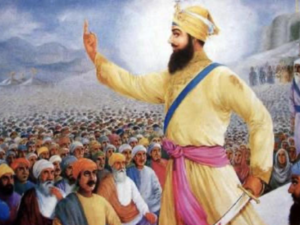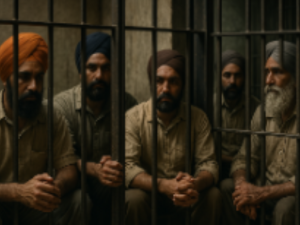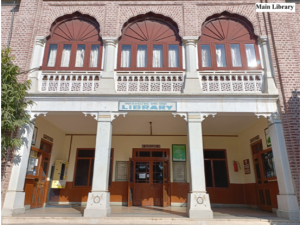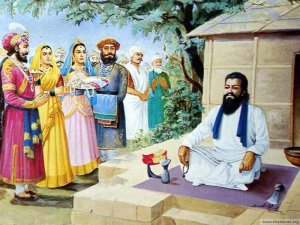The role of the Granthi at Sri Darbar Sahib, Amritsar, has evolved significantly over time, reflecting both the spiritual duties and socio-political influences on Sikh institutions. The term Granthi originates from the word Granth, referring to the Sikh scripture, Sri Guru Granth Sahib. A Granthi is not merely a reader of the scripture but a custodian of Sikh values, responsible for interpreting and disseminating Gurbani among the Sikh community. The history of the Granthis of Sri Darbar Sahib is deeply intertwined with the Sikh struggle, political movements, and institutional transformations. This analysis explores key historical figures who served as Granthis at Sri Darbar Sahib, their contributions, the shifts in management, and the evolving nature of the Granthi institution.
Key Historical Figures and Their Contributions
Bhai Sahib Baba Buddha Ji: The First Granthi
Baba Buddha Ji, the first appointed Granthi of Sri Harmandir Sahib, holds a unique place in Sikh history. A disciple of Guru Nanak Dev Ji, he had the rare honor of serving six Sikh Gurus. His appointment as Granthi at the age of 98 by Guru Arjan Dev Ji highlights the importance of spiritual wisdom and experience in this role. Baba Buddha Ji’s contribution extended beyond his duties at Darbar Sahib—he played a crucial role in training Sikh warriors and was a custodian of Guru Nanak’s teachings. His life exemplifies the synthesis of spirituality and service in the Sikh tradition.
Bhai Mani Singh: The Martyr Granthi
Bhai Mani Singh, a distinguished scholar and warrior, was one of the most revered Granthis of Darbar Sahib. His tenure as Granthi was marked by scholarly contributions and a commitment to Sikh unity. He systematized the tradition of Gurbani exegesis (katha) and played a significant role in preserving Sikh scriptures. His martyrdom at the hands of the Mughals for refusing to convert to Islam underscores the sacrifices made by Sikh religious leaders in safeguarding Sikh identity. The tradition of katha initiated by Bhai Mani Singh led to the formation of influential schools of Sikh scholarship, such as the Bhindran Taksal.
Bhai Gopal Das Udasi: A Transition to Udasi Influence
The period following the decline of Sikh power saw the emergence of Udasi Mahants managing Sikh institutions. Bhai Gopal Das Udasi, a learned Granthi from Jassowal, Ludhiana, was selected for the role during a time of political instability. His tenure reflects a phase in Sikh history when non-Khalsa sects, like the Udasis, played a significant role in managing Sikh shrines. The Udasis, while different in their practices from mainstream Khalsa Sikhs, helped sustain Sikh religious institutions during turbulent periods.
Bhai Fateh Singh and Institutional Reforms
Bhai Fateh Singh was a scholar and administrator who played a key role in the transition of Darbar Sahib’s management under the Gurdwara Act of 1925. Before the Act, Granthis controlled significant landholdings and properties associated with gurdwaras. With the establishment of the Shiromani Gurdwara Parbandhak Committee (SGPC), the economic and administrative control shifted from individual Granthis to a collective Sikh body. Bhai Fateh Singh supported these reforms and voluntarily handed over properties under his name to the SGPC. His efforts marked a shift from hereditary control of religious institutions to a more organized and democratic system.
Singh Sahib Giani Kartar Singh: A Scholar and Poet
A prolific writer and historian, Giani Kartar Singh brought intellectual vigor to the role of Head Granthi. His contributions in Sikh literature, including works like Dashmesh Prakash and Banda Bahadur, helped in popularizing Sikh history. His tenure also saw increased use of literary and poetic means to inspire the Sikh community.
Singh Sahib Giani Bhupinder Singh and the Sikh Agitation
Giani Bhupinder Singh’s leadership as Head Granthi coincided with the Punjabi Suba movement and other Sikh political struggles. He was accused of delivering anti-government speeches, reflecting how religious leaders at Sri Darbar Sahib often found themselves at the center of political activism. His role highlights the intersection of faith and political consciousness in Sikh leadership.
Evolution of the Role of Granthis
Pre-Colonial Era: Religious and Military Leadership
During the times of the Sikh Gurus and the post-Guru period, Granthis were not just spiritual guides but also military advisors and community leaders. Figures like Baba Buddha Ji and Bhai Mani Singh maintained both religious and martial responsibilities, ensuring that Sikhs remained united and prepared against external threats.
Colonial Period: Institutional Challenges and Reforms
The British colonial administration disrupted the traditional Sikh power structure, leading to increased Udasi and Mahant influence over Sikh gurdwaras. The Gurdwara Reform Movement (early 20th century) sought to restore Sikh control over their religious institutions. The passing of the Gurdwara Act of 1925 redefined the role of Granthis, making them employees of the SGPC rather than independent authorities with personal landholdings.
Post-Independence: Religious Custodians and Political Voices
In contemporary times, Granthis have continued to serve as religious teachers, but their influence extends into Sikh politics and cultural movements. Figures like Giani Bhupinder Singh actively engaged in political debates, illustrating how Granthis still play a role in shaping Sikh discourse.
The spiritual and historical legacy of Sri Darbar Sahib, Amritsar, has been upheld through the devoted service of its esteemed Granthis, who have carried forward the sacred responsibility of reciting and interpreting the divine Gurbani. This lineage of dedicated spiritual custodians traces its origins to the venerable Baba Buddha Ji, the first Head Granthi, whose unparalleled devotion and wisdom established a profound tradition. His successor, Baba Bindhi Chand Ji, continued this sacred duty, followed by the legendary martyr Bhai Mani Singh Ji, who not only served as a Granthi but also laid down his life for the preservation of Sikh scriptures and traditions. Over time, revered figures such as Mahant Gopal Das Ji Udasi, Bhai Chanchal Singh Ji, Bhai Atma Singh Ji, and Bhai Sham Singh Ji fortified the spiritual ethos of Sri Darbar Sahib. The tradition was further enriched by the contributions of Bhai Jassa Singh Ji, Bhai Jawahar Singh Ji, Bhai Harnam Singh Ji, and Bhai Fateh Singh Ji, each of whom upheld the sanctity of the Guru’s abode. The 20th and 21st centuries witnessed the remarkable scholarship and devotion of Giani Kartar Singh Ji Klaswalia, Mahant Mool Singh Ji of Goindwal, Giani Bhupinder Singh Ji, Giani Chet Singh Ji, Bhai Makhan Singh Ji, Bhai Labh Singh Ji, Giani Thakur Singh Ji, and Giani Achhar Singh Ji, whose spiritual discourse illuminated countless lives. The lineage continued with Giani Arjan Singh Ji, Giani Kapoor Singh Ji, Giani Niranjan Singh Ji, Giani Mani Singh Ji, and Giani Kirpal Singh Ji, the latter serving as Head Granthi and exemplifying erudition and humility. The spiritual guidance of Giani Sahib Singh Ji, Giani Mohan Singh Ji (Head Granthi), Giani Puran Singh Ji (Head Granthi), Giani Sukhjinder Singh Ji, and Giani Jaswinder Singh Ji (Head Granthi) sustained the sacred traditions of Sri Harmandir Sahib. In more recent times, the revered service of Giani Mann Singh Ji, Giani Raghbir Singh ji,Giani Amarjit Singh Ji, Giani Gurminder Singh Ji, Giani Balwinder Singh Ji, Giani Rajdeep Singh ji,Giani Sultanpur Singh ji and Giani Baljit Singh ji has ensured the continuity of this sacred duty. Together, these esteemed Granthis have embodied the spiritual resilience and scholarly excellence of the Sikh tradition, nurturing the divine wisdom of Guru Granth Sahib and safeguarding the sanctity of Sri Darbar Sahib for generations to come.
The history of the Granthis of Sri Darbar Sahib is a testament to the dynamic and evolving nature of Sikh institutions. From the spiritual leadership of Baba Buddha Ji to the martyrdom of Bhai Mani Singh, from the Udasi influence of Bhai Gopal Das to the scholarly contributions of Giani Kartar Singh, each phase in this history reflects broader trends in Sikh socio-political life.The transition from hereditary religious leadership to institutionalized management under SGPC was a significant turning point, ensuring that Sri Darbar Sahib remained a symbol of Sikh unity. While the primary role of a Granthi remains spiritual guidance and Gurbani interpretation, their historical contributions demonstrate a much wider impact, from armed resistance to literary scholarship and political activism.
As Sikh institutions continue to evolve, the role of the Granthi will likely adapt to new challenges, balancing religious duties with the ever-changing needs of the Sikh community.





